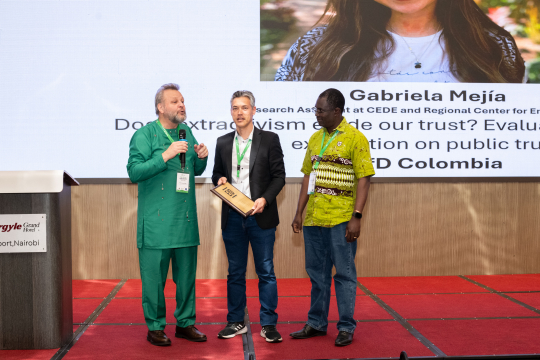The Gunnar Köhlin’s Award for Best Master’s Thesis, introduced 11 years ago, was originally aimed at students in the country hosting the EfD Annual Meeting. After some years, however, it became available for students in all the EfD countries. Since then, Colombian students have dominated. What is the secret, Jorge Bonilla, EfD Colombia’s Center Director?
“There are some external and internal factors that from my view are playing an important role,” says Jorge Bonilla.
EfD Colombia is hosted at Universidad de los Andes in Bogotá and works closely with other universities, such as Universidad Nacional de Colombia. They host several master’s programs in economics and engineering.
Strong focus on research
Being a private or state university is, however, not important. There have been winners from both privately owned Universidad de los Andes and state-owned Universidad Nacional.
“One of our programs, called our Graduate Program, has a strong focus on research. In the other, called Applied Economics, you can choose whether you want a research profile or consultancy, and you can decide whether you want to submit a paper or a consultancy report.”
There are also research-focused programs at Universidad Nacional. The possibility to receive extra training in how to develop a research paper, scientific methods, describe a research question, present results and conclusion is, according to Jorge Bonilla, crucial for becoming a successful researcher.
“This focus also means that many of our students are highly motivated to pursue a career as researchers.”
Opportunities to specialize
The universities in Colombia also make great efforts to pair up teachers who specialize in specific research areas with students who share that interest.
“Since we are part of the EfD network, we can offer our students to work together with other professors in the EfD network.”
Some students work extra as a TA (teaching assistant) and by doing that, they learn even more about a specific topic.
“When we see their skills and interests, we can also offer some students with a specific profile to be enrolled in a project.”
Highly competitive market
The students are, according to Jorge Bonilla, aware that the academic competition is very hard, especially for those who want a scholarship, and it’s even more competitive to get a position once you have your degree.
“We give them a lot of assignments to achieve the learning objectives. It’s hard work but it ensures that the learning outcomes have been fulfilled.”
The students can also get letters of recommendation to pursue further studies if they perform well, which is an incentive for them to work hard.
The university is also active in policy engagement and some students are involved in the production of policy briefs and events, which may also be beneficial for their careers.
Get published in working paper series
One aspect that sticks out in the case of EfD Colombia is that for some students their master’s thesis may get published in a working paper series.
“If their thesis gets grades above a certain level, we give them incentives to submit it as a working paper. It increases the visibility of student’s work. For some students, the work may even get published in a field journal”
He adds that one factor that contributes to the chances of receiving the Gunnar Köhlin Award is to focus on a current topic, that is, something that is high on the agenda for policymakers and other stakeholders.
“Many of those ingredients we have talked about are not unique for EfD Colombia, and maybe there are more factors. Also, some aspects are, of course, not our doing. But altogether, it may work as a recipe functioning well for us and our students,” concludes Jorge Bonilla.
